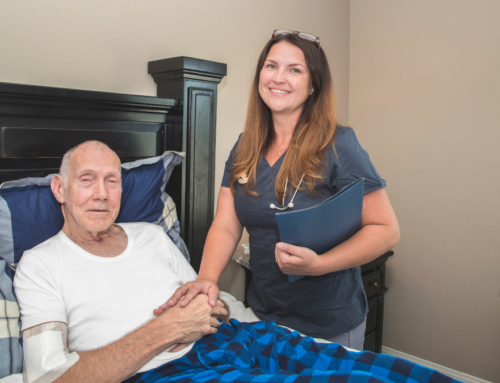
Dementia is a term used to describe the symptoms of a group of diseases that result in progressive loss of cognitive abilities. Dementia affects both memory and cognition, making it difficult for people with dementia to remember things or think clearly. There are many different types of dementia, all with their own set of symptoms. Some common types include Alzheimer’s disease, vascular dementia, Lewy Body Disease, Creutzfeldt-Jakob Disease (CJD), and Parkinson’s disease. If you or someone you know has been diagnosed with any type of dementia it can be very difficult to manage the daily tasks they once took for granted.
There are many ways you can help your loved one cope with their illness, such as by changing daily routines to make them more enjoyable, helping keep track of medications and appointments, or getting involved in activities that they were passionate about before dementia set in. Our blog will be a great resource for those who need advice on how to cope up with the challenges of dementia and knowing when to seek for professional advise.
Knowing the symptoms of Dementia
The signs of dementia are not always easy to identify, but there are a few telltale clues that can help you determine if someone has early-stage or late-stage dementia.
Dementia is often characterized by memory loss and the inability for one’s brain to form new memories. They may also have difficulty understanding what they read, recognizing people they know well from those who don’t mean them harm when out in public environments such as malls or airports. Other symptoms include speaking less than usual because it gets too hard with their impaired cognitive skills and depression due to the feeling of isolation caused by declining abilities like reading words on paper without seeing comprehension mistakes which used to be picked up before now being missed more frequently.
Symptoms usually appear in stages but each person can experience them differently. The following are common signs of early stage dementia;
-Short attention spans when listening or speaking
-Loses word midway during a conversation and starts over again from an earlier point
-Memory lapses or loss of recent memories
-Finding it hard to make decisions, follow a sequence of steps (e.g., cooking), do complicated tasks
-Slow mental processing and difficulty understanding information, instructions, conversations
Understand that dementia is a disease, not a person.
The spectrum of the disease means that there is no one way to define a person with dementia.
It is important to understand that dementia is a disease, not your loved one. As their brain deteriorates they are unable to think as clearly and there can be emotional changes too such as increased irritability or sensitivity. It’s difficult for the person living with dementia when they begin losing abilities which used to come so easily. When you’re dealing with someone with dementia, you need to adjust your expectations and be prepared for the future that is coming.
He or she may forget what they ate earlier in the day, where their car keys are located, or how best to do something; this will make everyday tasks more difficult as time passes.
Aging is an unavoidable part of life, and each individual will experience it in their own unique ways. For those who have been diagnosed with dementia, aging can be particularly rough as they are undoubtedly facing more challenges than most people do at any given point in time; however, this does not mean that living well becomes impossible for these individuals!
Don’t be afraid to ask questions – the more you know about the illness, the better caregiver you’ll be.
Your family has been through so much, it’s not a surprise that you’re struggling to understand things like dementia. The more questions you ask and the better understanding of your loved ones’ needs that you have will make for an easier time caring for them in their aging process.
One older man was feeling pretty down. He didn’t know how long he’d be around because his sense of time gets all mixed up as part of Alzheimer’s disease or some other form of dementing illness (depending if this was one incident). Sometimes people might think they are still living life back when grandma died at age 60 but really now grandpa just turned 100! So don’t let those little moments slip by without acknowledging what they mean.
Create routines and rituals for your loved one – this will make them feel safe and secure while also giving you some peace of mind.
While the person you love may need some time to adjust, eventually they will come around and be more at ease. By establishing routines for them – like putting on their favorite shirt before bed or brushing their teeth with a specific toothbrush that is only used by one other family member – it will give them an anchor in order to feel safe. And as always, make sure your loved ones know how much of a priority they are.
There’s nothing quite so important as taking care of those we love most- which is why rituals should be created together between both parties involved; this way everything feels familiar but also new because there can never truly be too many ways to cherish someone who has impacted countless lives just by being themselves.
Let your loved one tell their story – it will help them feel less alone and provide valuable information for doctors.
Their stories are power. By allowing them to tell their story without interruption, they can potentially provide valuable information for doctors and loved ones who need to know how exactly the disease has taken over every aspect of their life. You may feel like you are being nosy or pushy, but it’s important that they get all of the information out before we can make an accurate diagnosis for them.
Know when to seek professional help – if your loved one’s symptoms worsen or they are showing signs of depression, get in touch with a doctor as soon as possible.
It is important to know when it’s time to seek professional help. If your loved one starts showing signs of depression, like worsening symptoms or more thoughts about suicide, then you should contact a doctor immediately before the situation gets worse and they are unable to get in touch with anyone for fear of hurting themselves.
Seeking professional help can help you ease the burden of care for your loved one while they are going through the process. Depending on how severe the dementia is, you may be able to help with some tasks at home that will make it easier for them and those taking care of them.
It’s important not to push too hard or get frustrated if things do not go smoothly in this process.
Remember that there is no cure for dementia but there are ways to manage its effects on both patient and family member.
The best way to manage the effects of dementia is by taking care of yourself, your loved one, as well as all other caregivers in an understanding manner. Here at Silver Companions, we provide not only physical but also emotional support for our families that have been affected by this disease which can be quite isolating without some kind words from a friend or relative who understands what they’re going through.
Dementia is a frightening disease. It’s not only difficult to diagnose, it also has no cure and can’t be stopped from progressing once the symptoms start showing up. But that doesn’t mean you should ignore the warning signs or wait until they get worse before seeking help! If you have any of these five early-stage dementia symptoms, reach out to us so we can help assess your situation and provide recommendations for next steps. We’re here for you – you can either give us a call at (678) 494-8129 or email us at info@SilverCompanions.com.
With the help of your loved ones and medical professionals, you can find ways to make dementia a less challenging part of life. We hope that this blog will provide valuable information on how to manage daily tasks with someone diagnosed with any type of dementia. If you or anyone else has questions about dementia please let us know!





